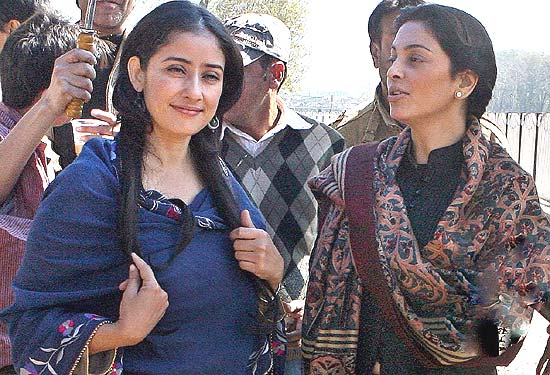 The Japanese Wife
The Japanese Wife
Cast: Rahul Bose, Chigasu Takaku, Raima Sen
Director: Aparna Sen
Rating: Three and a half starsYou return home with The Japanese Wife, the ninth feature film directed by Aparna Sen, the 64-year-old Kolkata-rooted actress. It stays with you. Although the tempo is excruciatingly slow and the screenplay repeats lines of dialogue as if they had been written by a squawking parrot, the result is limned with that near-extinct quality in cinema – humaneness.
Humanism was the leitmotif of Sen’s director and mentor –the great Satyajit Ray. Truly how you miss him. The actress he introduced in Teen Kanya (1961) has sought to carry the tradition forward, sticking to her home base and narrating stories that alternately rejoice and mourn with its characters. Of all her bids to take you through the heartscapes of her people, 36 Chowringhee Lane and Mr and Mrs Iyer remain her most accomplished, to-cherish-forever works.
Neither are her people grilled by grinning Mogambos. Nor are they paragons of virtue. They are buffeted by the societal circumstances and conditions around them, and by their own anxieties and desires. Take Paroma, in which adultery within a bhadra log house was tackled. In a way, Sen was retelling an updated Charulata, not with the same artistry, no way, but still it was a courageous effort,remarkable also for Raakhee’s career-best performance.
Vis-à-vis The Japanese Wife, it’s her most romantic work yet. Snag: it strikes you as largely implausible. A decade-and-a-half-long love story of a mild-mannered schoolteacher (Rahul Bose) in the Bengal interiors , and a chirpy girl (Chigasu Takaku) in a Japanese village, coerces you to suspend your sense of disbelief. Come on, this is much too far-fetched you go. They don’t set eyes on each other but behave as if they were to a Laila Majnu-manner born. Awww.
Okay, so what if the screenplay has been adapted from a story by the Oxford University-anchored Kunal Basu? The adaptation emphasises the innocence and the guilelessness of the odd couple, to the absolute exclusion of credibility. Placing the film’s dramaturgy within a realistic context – shooting on authentic locations, for instance – cannot prevent you from concluding that this is some kind of grim fairy tale. Which is why like it or not, The Japanese Wife isn’t as effective or as real (read: yes this could happen) as Sen’s Chowringhee or the ..Iyers.
Never mind. Because the outcome still clasps you in human bondage, the ironical finale moving you to tears. Without revealing the end, suffice it to say, the last 15 minutes or so vault way above the rest of the plotlet. Sen does it again, despite the obstacles and incredulous twists and turns on the way. She makes you care for her people. Genuinely.
The mousy teacher lives with his aunt (Moushumi Chatterjee, could have been more controlled). And the fey Japanese girl is bound to her home because of an ailing mother. Teacher and his oriental girl have been pen pals since years. Their letters to each other are read out, a device that is as unusual as it is endearing. So obsessive about each other, the two even believe that they are formally ‘married’. The Bengal hamlet is amused but can gets xenophobic during an Indo-Japanese kite flying competition. A somewhat protracted but disarmingly funny sequence this.
Something’s got to give. A young widow (Raima Sen) and her adolescent kid (Rudranil Ghosh) begin to crowd the teacher’s isolated life. Meanwhile, in Japan, the girl is hit by a terminal illness, forcing her to shift to Yokohama. Devastated, her ‘husband’ desperately seeks all forms of medical panaceas – unani, ayurvedic, allopathic.
A touching moment shows the girl in Japan drinking a mixture sent from India, and saying, “It has not shown any effects…but don’t worry…it will.” His hurried calls, with a mounting telephone meter, also make your heart go out to the teacher and to the only shred of love in his life. Earlier, he has been shown masturbating, and at another point, feels guilty about being attracted to the widow.Such moments are handled aesthetically and with maturity.
In fact, it is Aparna Sen’s intimate style that elevates the film beyond the archaic. But for references to email, a Bidi jalayele excerpt on television, you often feel lost in an earlier millennium. A Bengal village may be lost in time, certainly, but not to the extent of existing in a vacuum. On the upside, for social commentary Sen includes impactful asides like the widow refusing to eat fish served to her in a rustic restaurant, since denial is now her lot in life.
Read more
HERE




